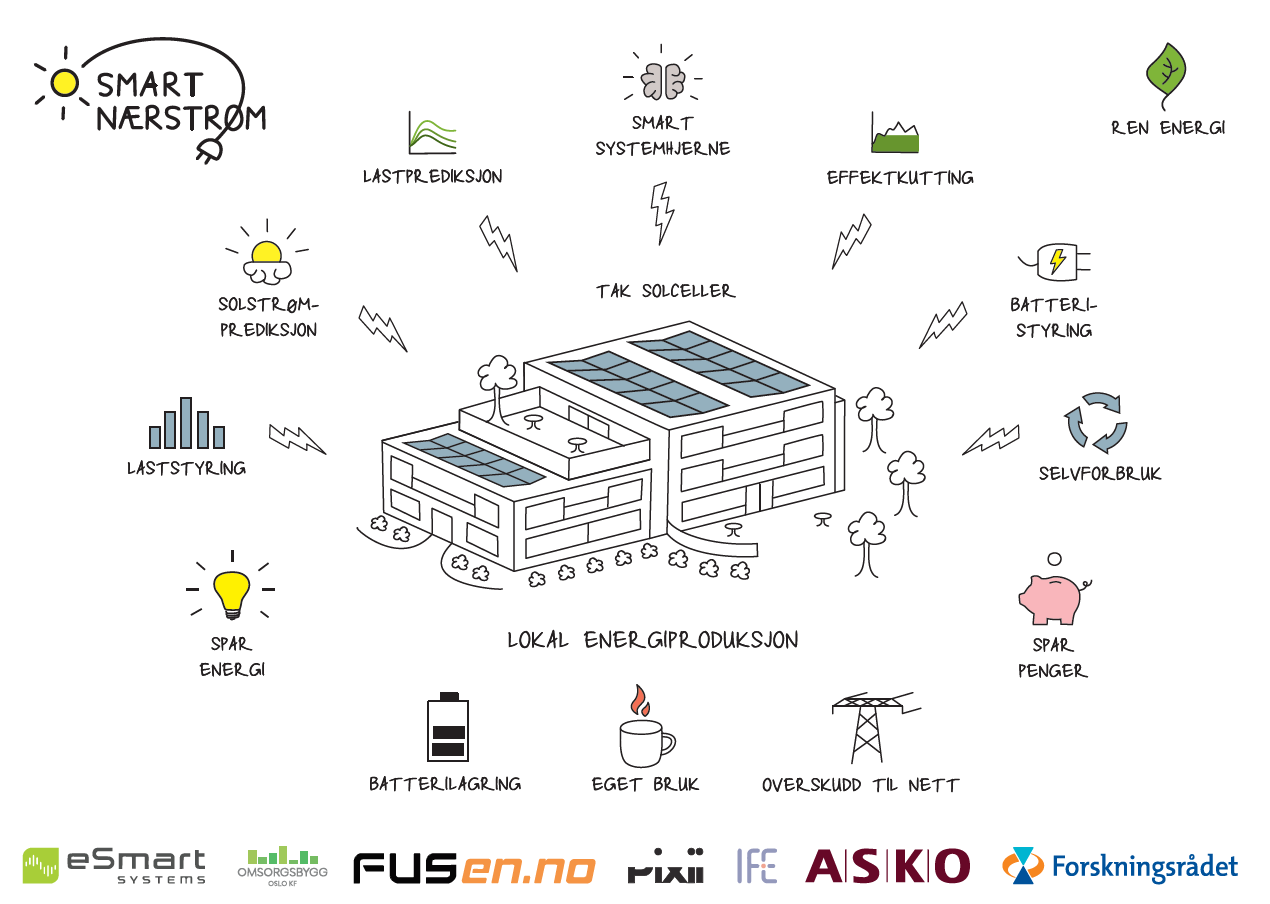Smart Nærstrøm
In the Smart Nærstrøm project, we have developed algorithms and practical solutions to manage the energy system in public and commercial buildings with local, renewable energy production. The implementation at the first pilot at ASKO Vestby, is now in its final stages. The research project is a collaboration between eSmart Systems, Pixii, FUSen, Omsorgsbygg, ASKO Vestby and IFE, and is supported by the EnergiX program in the Norwegian Research Council. The research will be realized through two pilots, ASKO Vestby and Ryen Helsehus.
Commercial buildings are becoming small urban power plants, with local production, storage and flexible use of electricity. Managing the complex energy system in commercial buildings can provide smart buildings which reduce both the cost and the consumption of electricity.
The energy management system and the battery will enable the buildings to use more of the solar power they produce themselves, but even more importantly, the system will reduce the peak power throughout the year and hence contribute to lowering the cost driving power tariffs. In addition to installing a battery, ASKO Vestby has, together with the partners in the project, identified flexible loads. The flexible loads provide a great opportunity to reduce the power tariffs further. In 2020, the consortium has developed predications and control algorithms for these flexible loads. The load management will be implemented by the end of 2020. This will contribute to even greater reductions in electricity cost, without affecting the comfort or functions of the building.
To realize a smart energy management system the building must be able to predict how much electricity it will need, how much it will produce and the cost of consumption. The management system receives information about which loads that may be reduced, how the battery mode should be optimized to reduce the power tariffs and maximize self-consumption. In the project we have developed logic, software and products to optimally manage the energy consumption in a building. We collect information from the building, about temperatures, battery condition, PV production, current electricity consumption and active loads, in addition to weather-forecasts and electricity prices. Based on this information the system make prognosis for the future consumption and production of the building and evaluates the most cost-efficient management of the energy system in steps of 15 minutes for the next 48 hours. The interface between the battery inverter and the energy management system is also developed in this project to improve the communication and efficiency of the battery.
Naturally, it is important for the team at ASKO to have complete control over the advanced energy system in the building, including the PV system and the battery. This is provided through new dashboards, developed by eSmart Systems according to the specifications desired by the project partners. In addition to the dashboard designed to give operational control, a separate dashboard is designed and implemented to provide the management and visitors with key numbers from the energy management system. The dashboards have been operational since the beginning of 2020. The system will also be installed in the other pilot in the project, Ryen Helsehus, in 2021.
The work in Smart Nærstrøm has also resulted in new algorithms for monitoring of PV systems in Norway. As the initial investment for a PV system is substantial, monitoring of the system is important to ensure that the system is working according to its specification. In 2020 we have carried out an analysis to quantify the degradation of the PV system at ASKO. To quantify degradation impacts both how much electricity the system produces and how long it can be expected to live. We found a very low degradation rate of 0.2%, which is substantially smaller than the guarantee of approximately 0.8%.
The partners in this project includes two of Norway’s greatest producers of local PV power, ASKO Vestby and Omsorgsbygg. Both have ambitious climate goals and energy efficient buildings with local power production is one important means to reach their goals. eSmart Systems have long experience with developing digital intelligence and software for the energy business. Pixii is a start-up company developing inverters for battery systems. FUSen are specialists at developing PV installations and have managed many of the largest and most advanced PV installations in Norway. In Smart Nærstrøm, FUSen seeks to improve and simplify the operation & maintenance of the PV systems. IFE is the research partner and is managing the project. IFE hosts Norway’s leading research group on PV system analysis and building integration.
